I haven’t done any client SEO work for many years, but I’m sure the gist is much the same as it was 5-10 years ago:
Can you rank my website #1 in Google for these keywords? How long will it take? How much will it cost?
Nothing is wrong with any of those questions, but they do demonstrate a fundamental misunderstanding of how SEO works in 2019. Why? Because ranking #1 doesn’t always equate to SEO success.
The amount of traffic (that drives sales and conversions) is what really matters.
If you’re tired of explaining this to clients, then you’ll love the results of this study.
The epiphany: the top-ranking page doesn’t always get the most search traffic
I use Ahrefs Keywords Explorer—our keyword research tool—almost daily.
Most of the time, this is to check the search popularity of topics we’re thinking of writing about on the blog. Sometimes though, it’s just for fun.
Case in point, last week I found myself wondering about the most popular searches that start with “how do I learn.”
Curious too? Here you go:
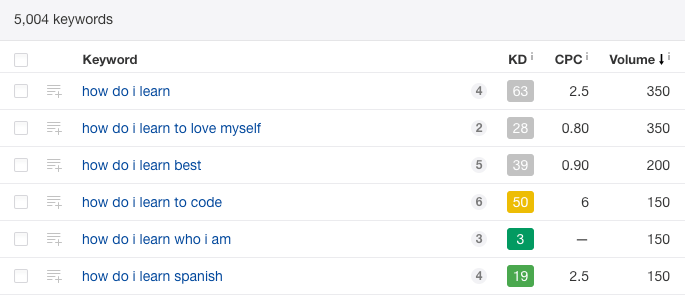
Still, these days, I rarely pay much attention to the search volume of individual keywords (I explained why here and here). Rather, I look at the amount of search traffic to the top-ranking pages.
To explain why, take a look at the query “submit website to search engines” in Ahrefs’ Keywords Explorer. It gets 1,400 searches per month in the US.

If we assume a click-through rate of ~30%, then the search traffic potential of this keyword in the US is ~400 per month (1,400 * 0.3).
Now look at how much US search traffic the top-ranking pages get:
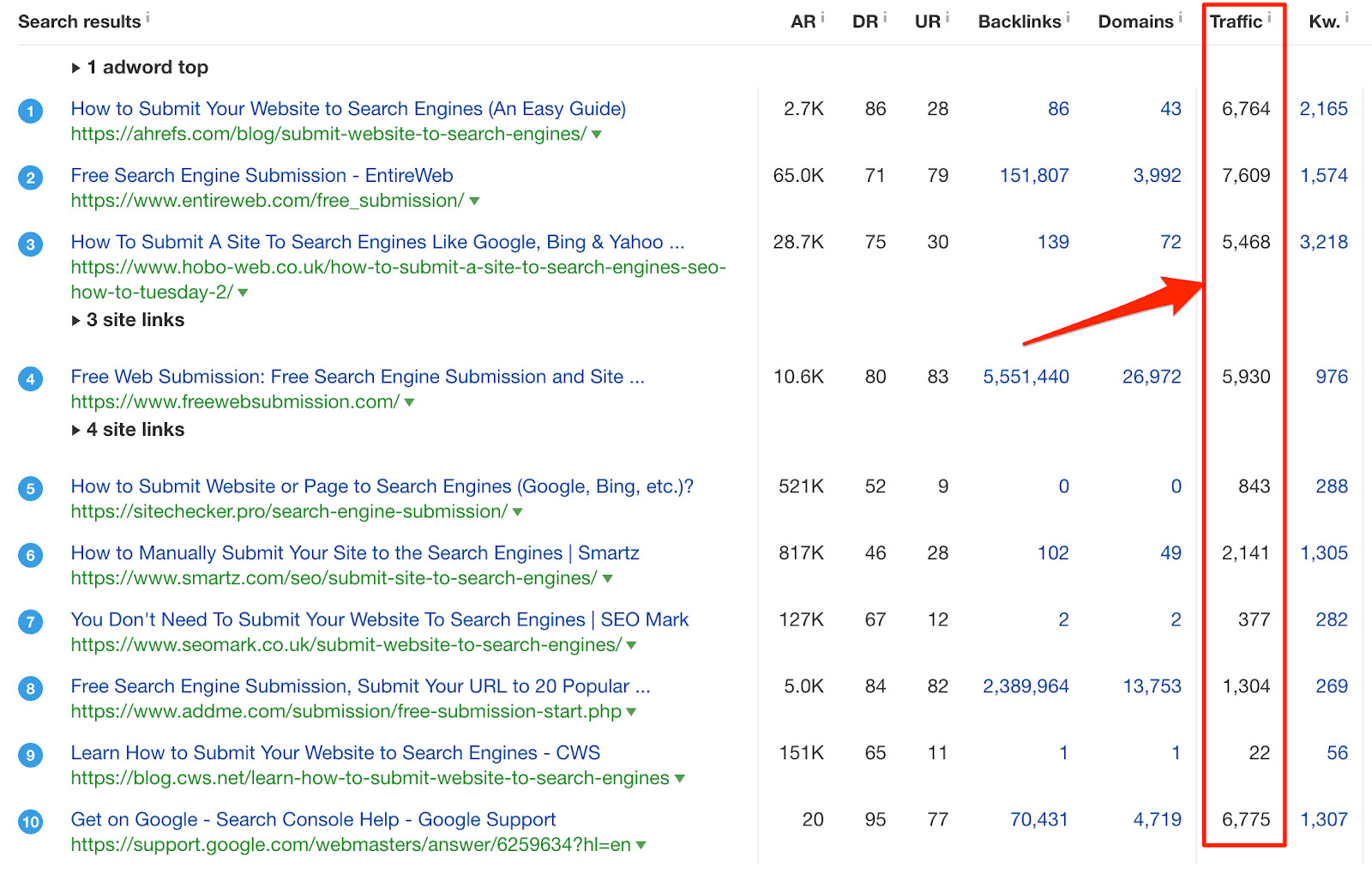
Some of those numbers are closing in on 20x our estimation above!
Why does this happen? Because those pages also rank for—and get traffic from—hundreds of long-tail keywords.
Now take another look at the screenshot above.
Do you notice anything? I do:
The top-ranking page isn’t the one that gets the most total search traffic!
This is something I notice all the time. The top-ranking page often gets less search traffic than other pages in the SERP.
Here’s another interesting observation:
The traffic numbers of the top-ranking pages rarely show the trend you might expect. They don’t always go in descending order.
This is the case in the screenshot above. The page ranking in position #1 gets less traffic than those in positions #2 and even #10!
So, the question is: how often does this actually happen, and what impact (if any) does it have on the way you do SEO?
To answer this question, I got our data science team to study this at scale.
The study: how often does the top-ranking page not get the most search traffic?
Here’s what we did:
- Took over 100,000 (non-branded) search queries with at least 1,000 searches* per month in the US;
- Pulled the top 10 ranking pages for each of them;
- Pulled the total US search traffic for each of the pages;
- Calculated how often the top-ranking page got the most search traffic.
And here’s what we got:
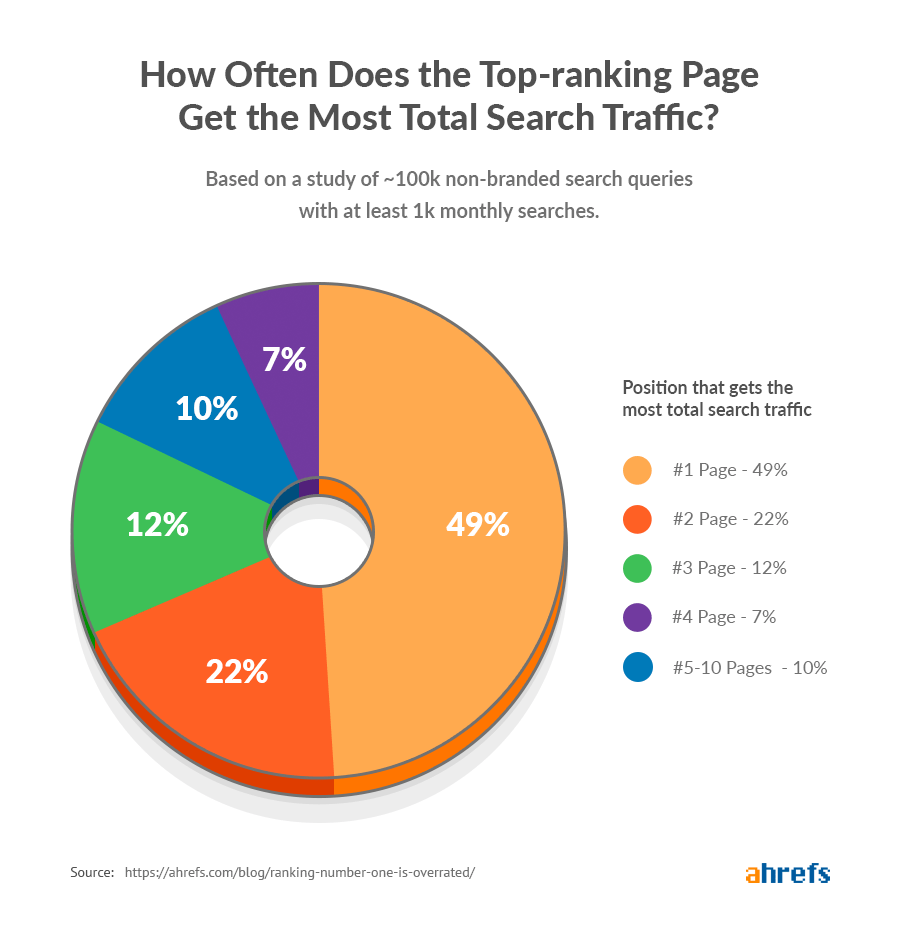
This pie-chart clearly shows that ranking #1 is overrated.
The top-ranking page gets the most total search traffic only 49% of the time!
The lesson: it’s time to stop agonizing over ranking #1 and start focusing on relevant search traffic
Please don’t get me wrong here.
I’m not trying to convince you that ranking #1 for your “main keyword” is a foolish goal. It isn’t, so there’s no need to stop sending your clients pretty reports detailing the ranking progress for their desired keywords.
The position of a page in Google for your head term is still a good indicator of SEO success.
In fact, it has the highest correlation with the search traffic of a page out of all the variables we’ve studied:
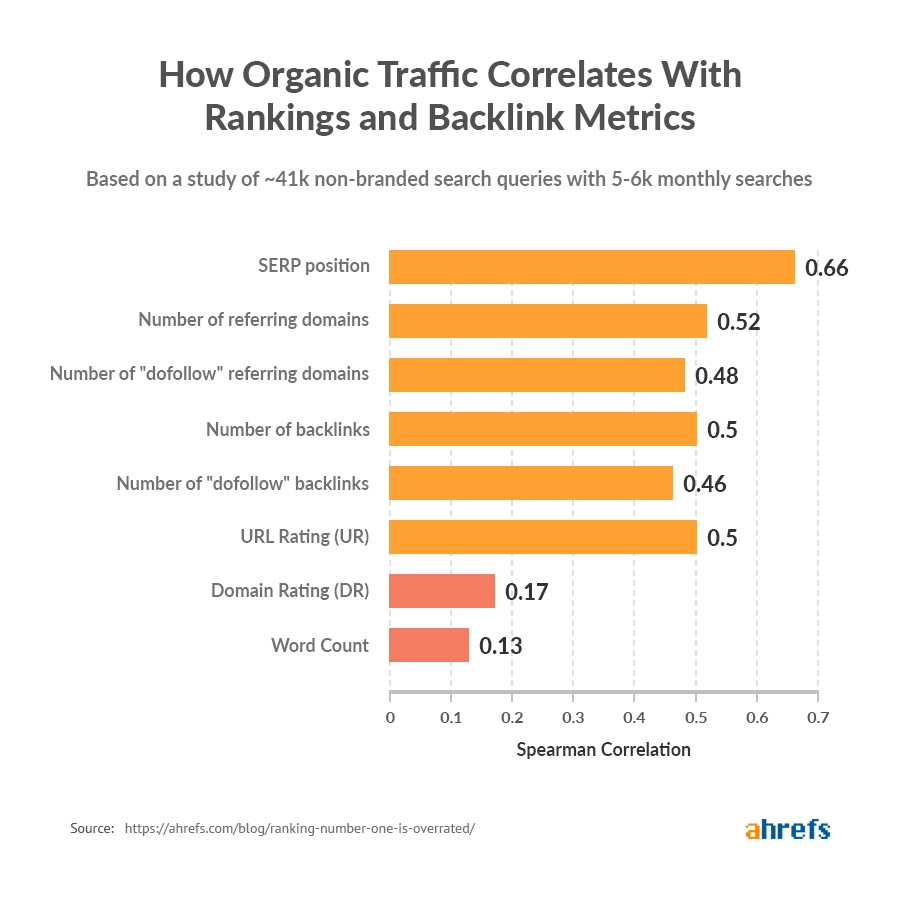
But notice how it doesn’t correlate at “1.”
That means it’s possible to get more traffic than your rivals even when they outrank you.
And here is how you do that:
1. Cover your topic in more depth
Here are the top-ranking pages for the search query “keyword research tools:”
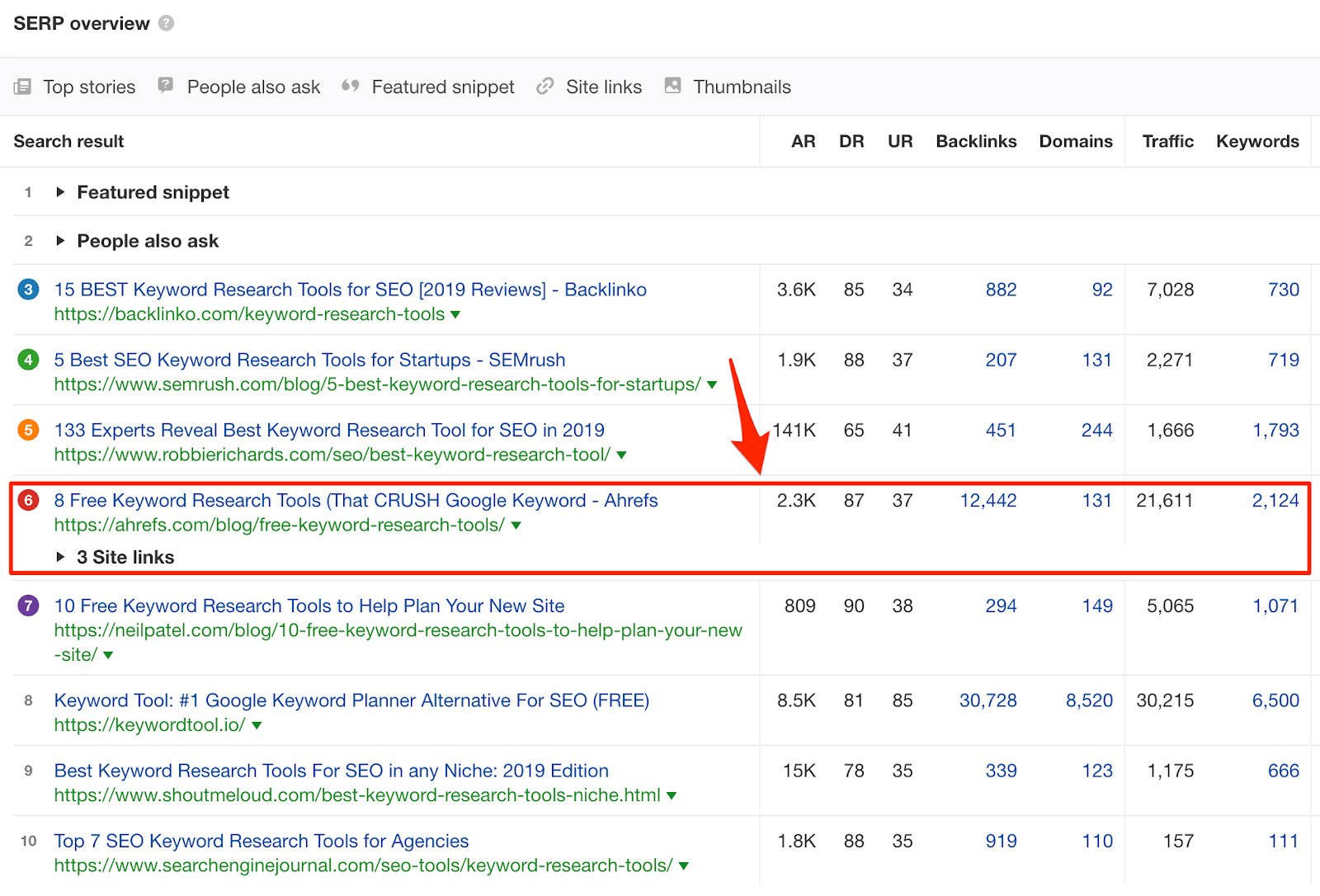
Our post only ranks at position #6, yet gets almost 3x more traffic than the article from Backlinko that ranks #1.
One of the reasons for this is that we went after two very close topics with a single article:
- “keyword research tools”
- “free keyword research tools”
So not only do we rank in the top 5 for queries related to keyword research tools…
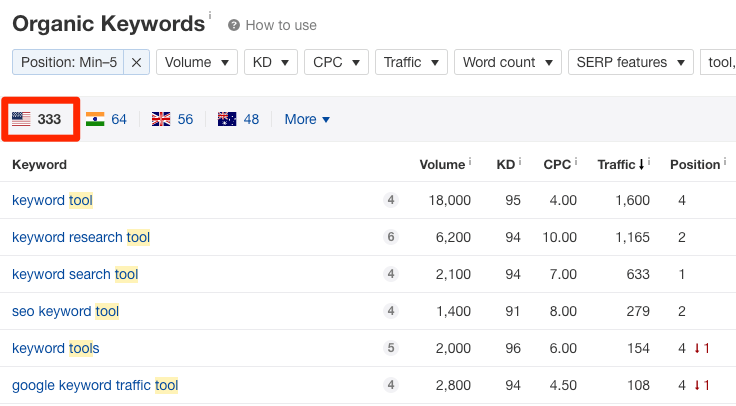
… but also free keyword research tools.
In fact, our article ranks in the top 5 for 191 search queries (in the US) with the word “free” in them.
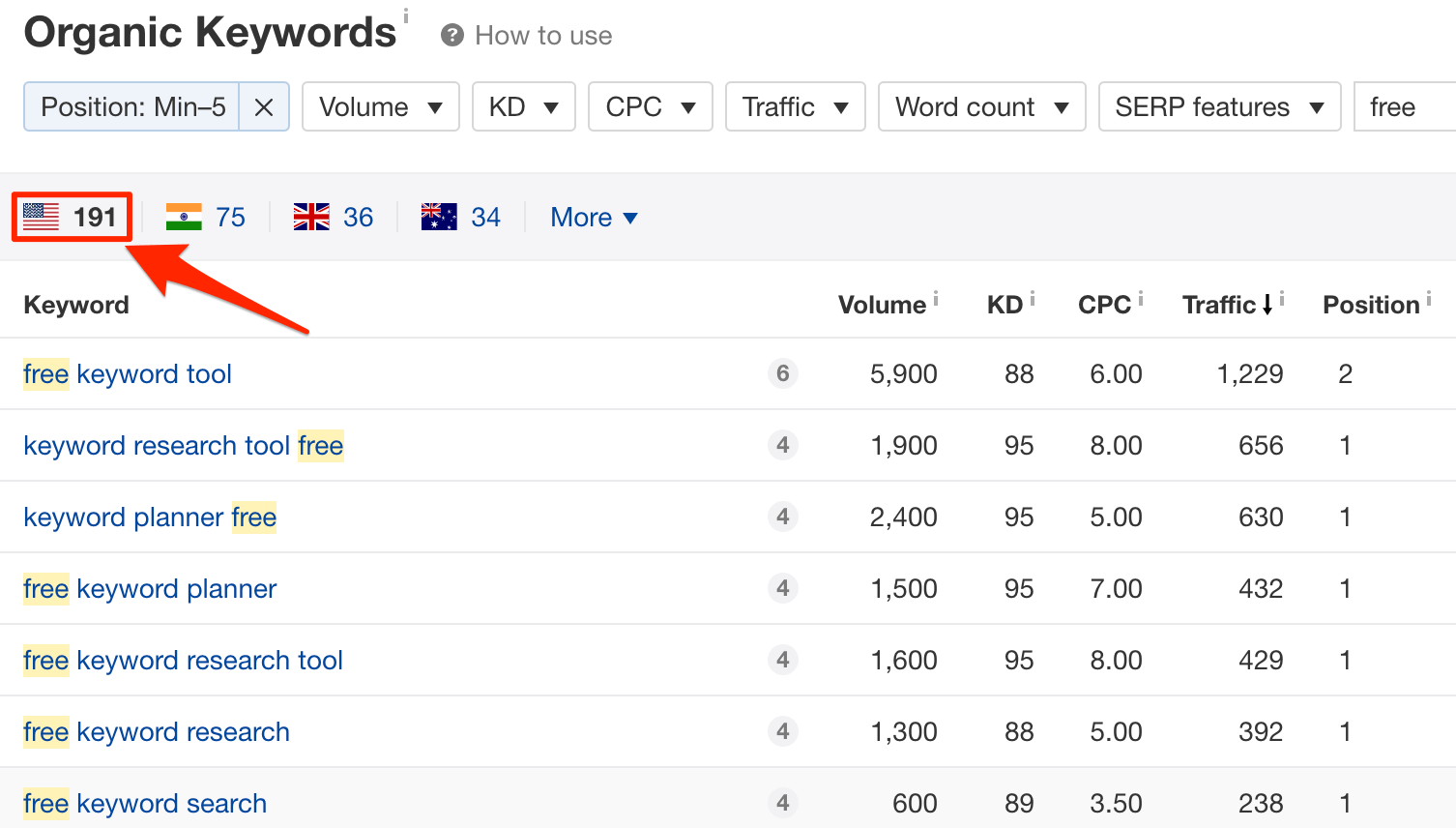
The top-ranking article from Backlinko only ranks for four.
So how do you actually “cover your topic in more depth?” Here are a couple of tips:
Tip #1: Check the Phrase match report in Ahrefs’ Keywords Explorer. Look for long-tails you can simultaneously cover alongside your main topic.
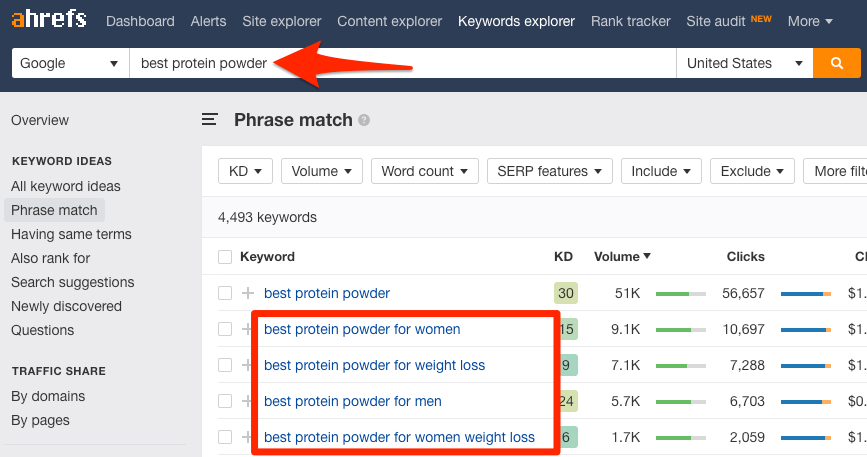
Tip #2: Paste the URLs of the top 3 ranking pages into our Content gap tool. Filter only for keywords that include your main topic.
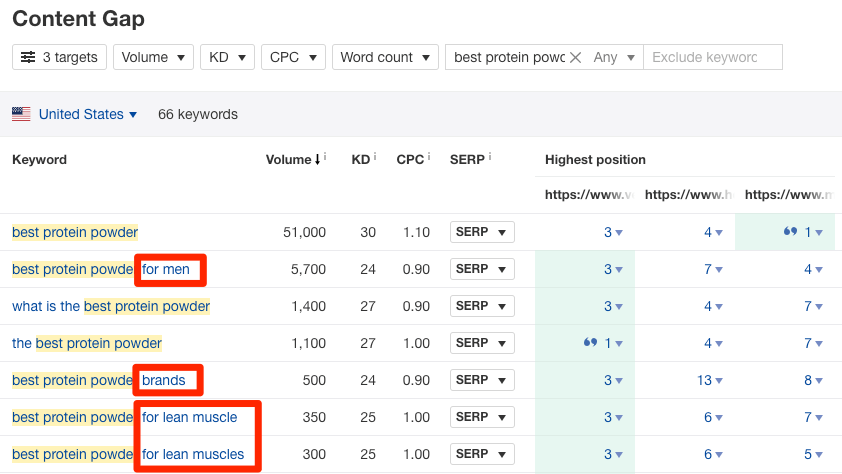

My next point can probably be considered an extreme case of this, rather than a standalone one, but still…
2. Create an “authority” page on your topic
Take a look at this SERP for the keyword “chocolate lab:”
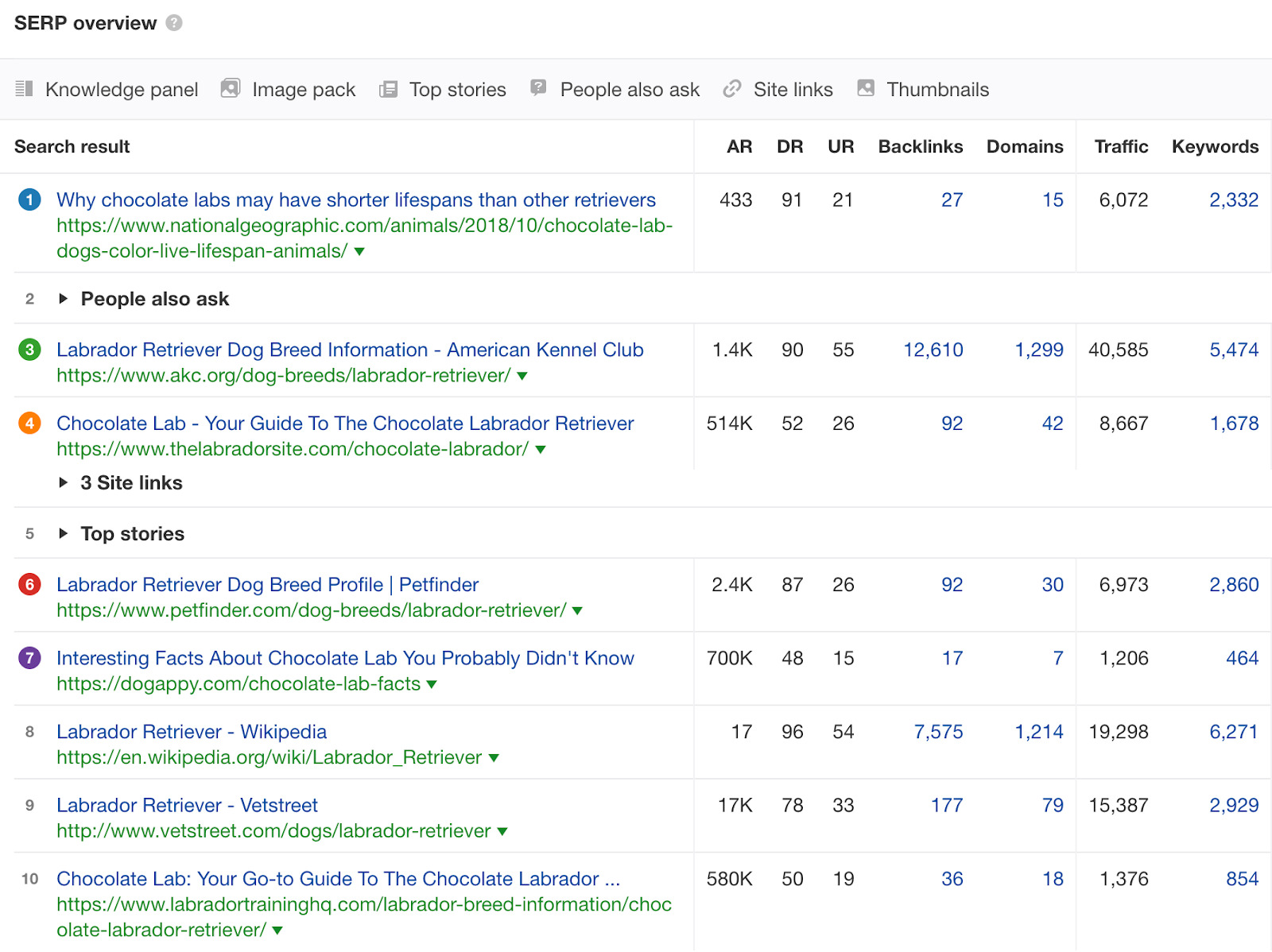
Two interesting things are happening here:
First, the page in position #4 gets more search traffic than the top-ranking page. If you open both these articles side by side you’ll immediately see why:
- “Why chocolate labs have shorter lifespans […]” is most likely ranking so high thanks to the click-bait nature of its headline. There’s no way you could ignore that headline if you were researching chocolate labradors.
- “Chocolate Lab - Your Guide To The Chocolate Labrador Retriever” is a clear attempt to create the best possible resource about chocolate labradors. It’s hardly surprising that it gets more relevant search traffic than the other pages. Google has even rewarded it with three site links.
Second, there are three pages that get way more traffic than the rest.
Let’s look at their common traits:
- They come from high-DR websites;
- They have a disproportionate amount of backlinks;
- They’re not targeting a narrow topic, but are broadly-focused.
In other words, they’re comprehensive articles with lots of “authority.” That makes them relevant and valuable results for a bunch of long-tail queries too.
You can observe something similar in our industry with Moz’s “Beginners Guide to SEO.”
This guide has accumulated so much “authority” over the years that it now ranks for tons of SEO-related queries and gets an enormous amount of highly-relevant traffic.
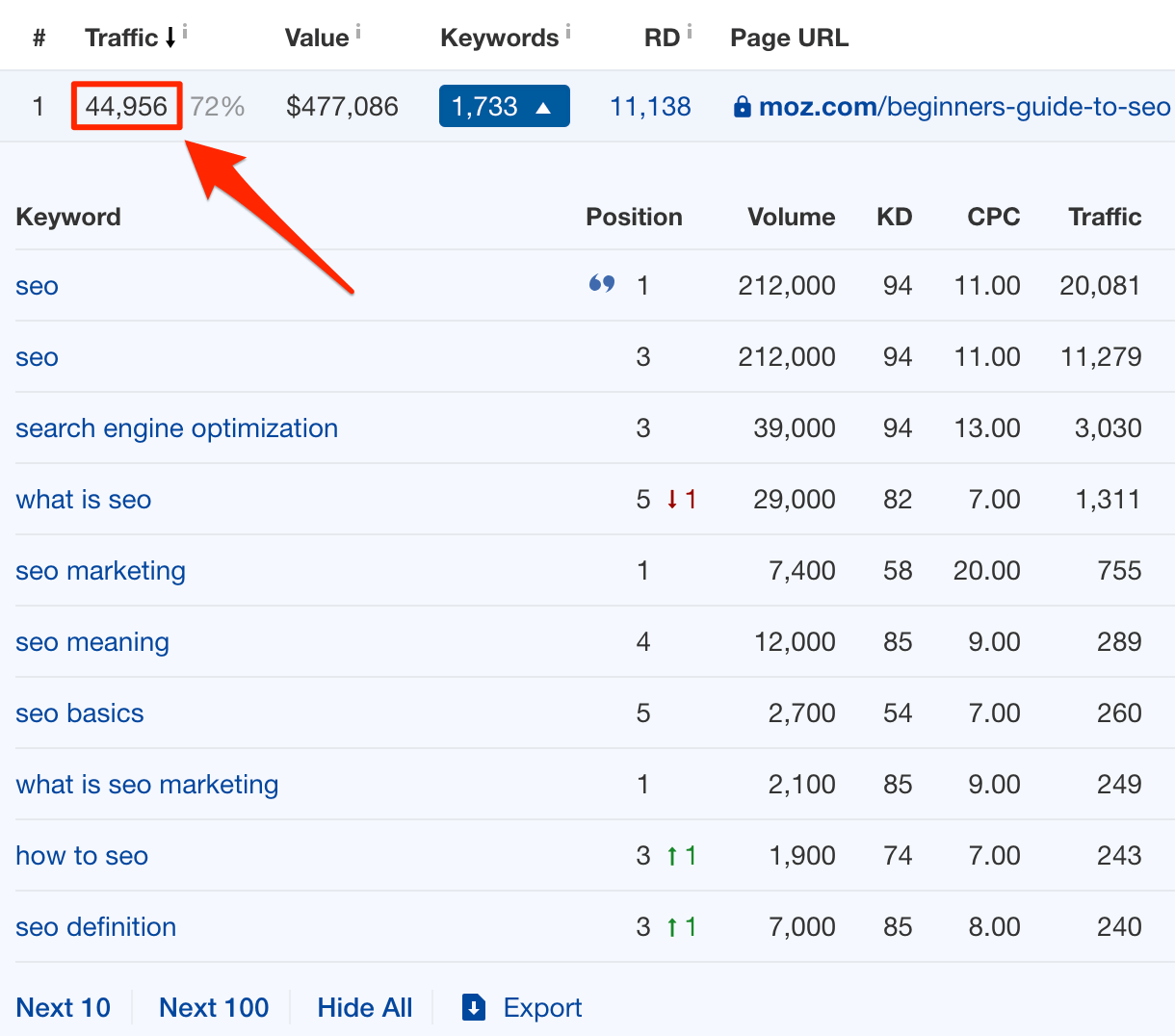
Just look at the search results for “what is SEO.”
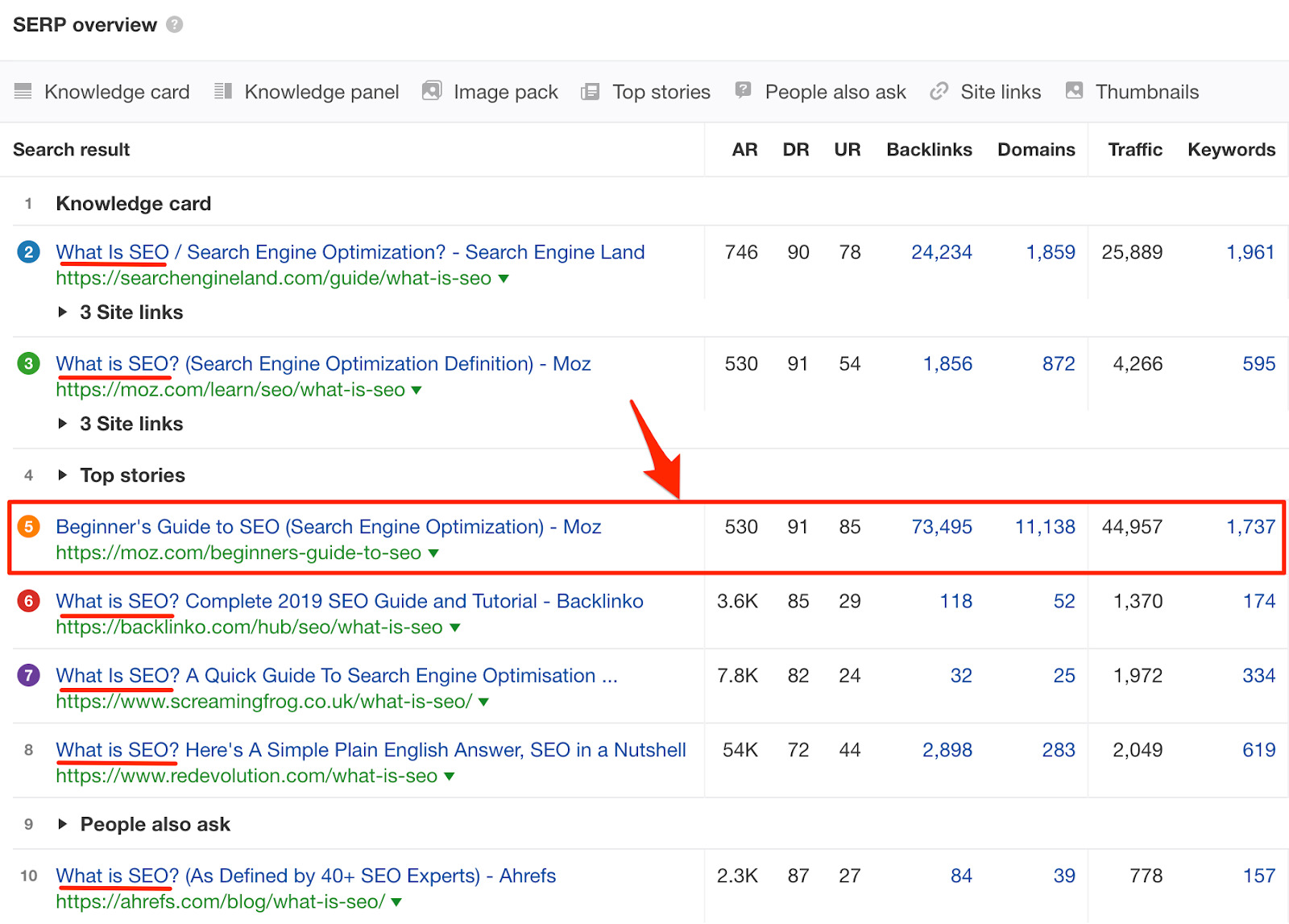
That page is the only broadly-focused result in the top 10.
And this leads us to the final ingredient for maximizing your total search traffic:
3. Nail search intent
Did you notice that the Wikipedia page on labrador retrievers ranks in the top 10 for “chocolate lab?”
That’s because people are happy to learn about chocolate labradors in the context of the general dog breed.
How do we know? Because Google is known for tracking “searcher satisfaction.” If people weren’t clicking on those results, or if they didn’t address their needs, Google would soon figure that out and remove them from the SERP.
Here’s a nice example of how nailing searcher intent trumps traditional on-page factors:
Last year, we wanted to rank for the keyword “backlink checker.” So we made a landing page and described the backlink checking functionality in Ahrefs’ Site Explorer.
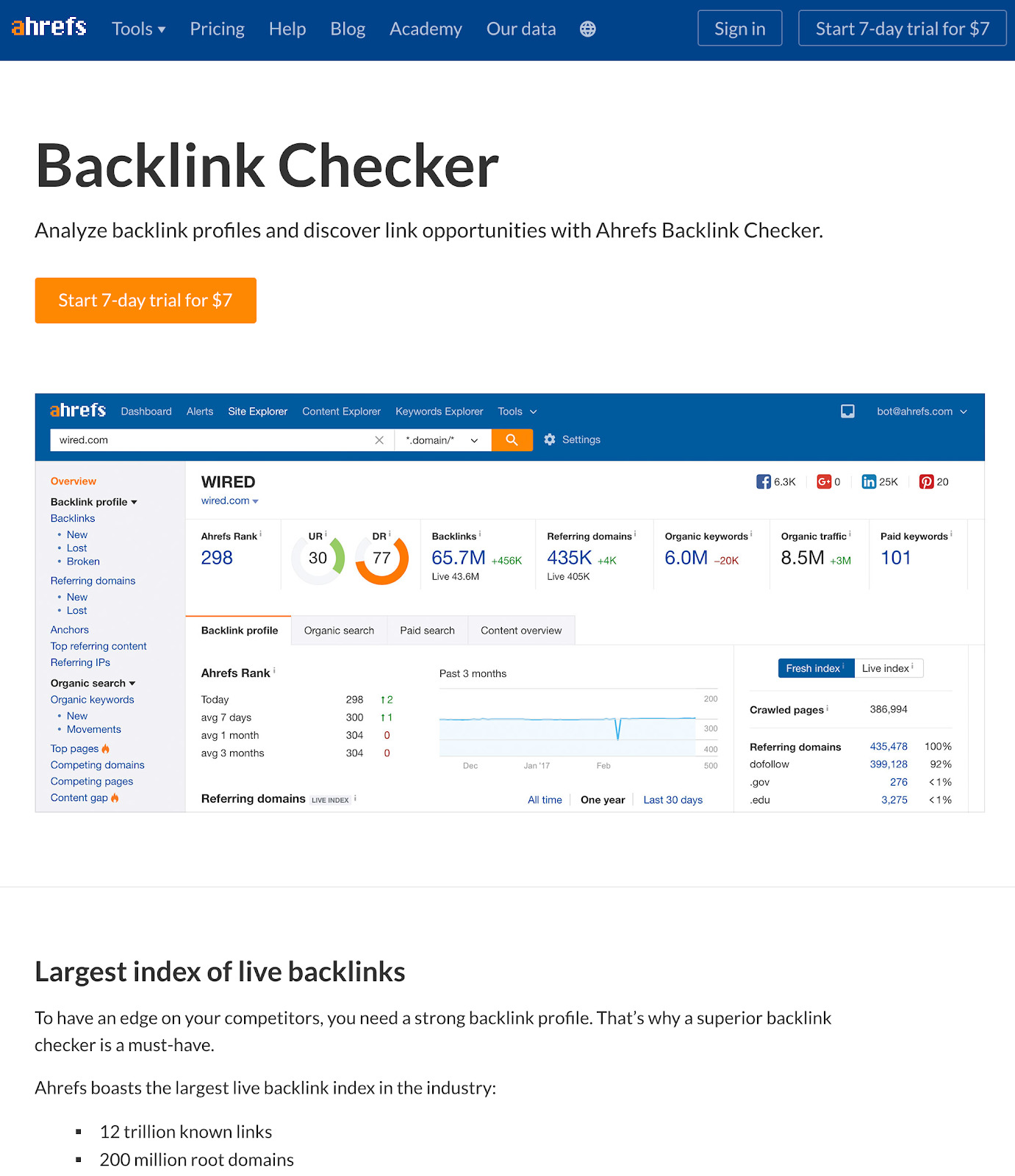
No matter what we did with this page, we couldn’t get it to rank.
- We optimized it for the keyword “backlink checker;”
- We polished its speed, mobile-friendliness and other technical SEO aspects to perfection;
- We added a lot of internal links;
- We did some outreach to earn quality external links.
Nothing seemed to move the needle. So here’s what we did:
We looked at the current top-ranking results to try to better-understand search intent. It didn’t take long for us to realise the issue. All the pages ranking in the top 5 were free tools that searchers could start using right away. Our landing page listed product features. #facepalm
So we built our own free backlink checker tool and added it to the page.
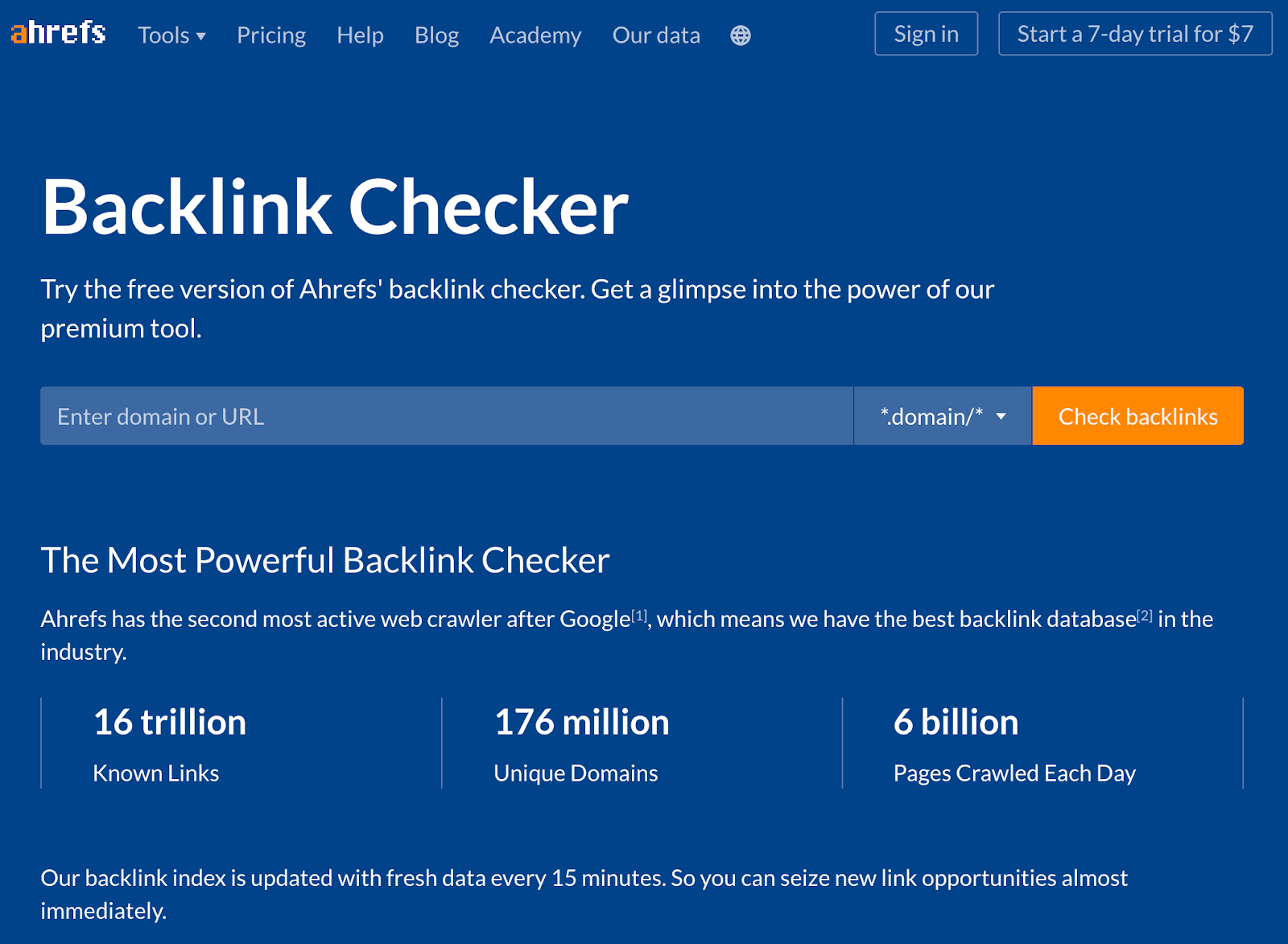
We didn’t change much else.
- The content remained largely the same.
- No extra on-page SEO.
- No extra technical optimizations.
Basically, we added an input form that turned our landing page into a free tool. Nothing complex.
The result? We shot up to the #1 position for “backlink checker” in a matter of weeks:
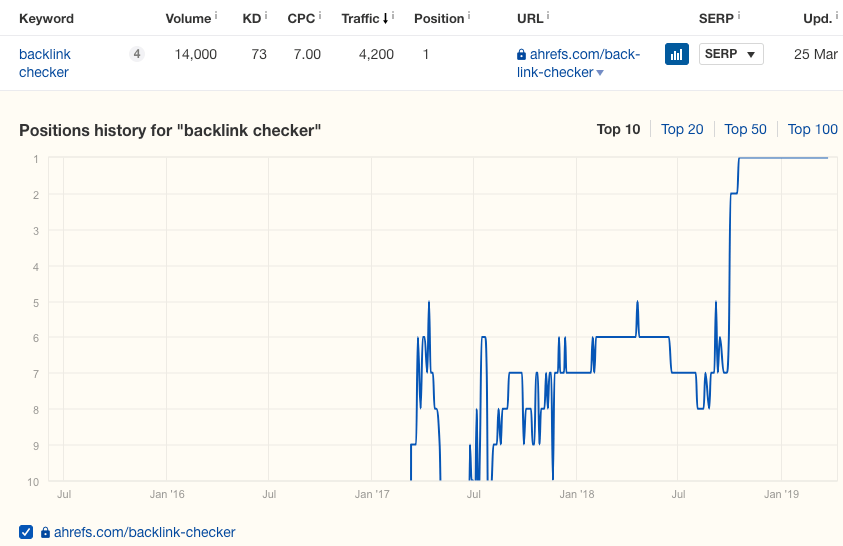
That page then started ranking for more and more relevant search queries, resulting in more and more traffic:
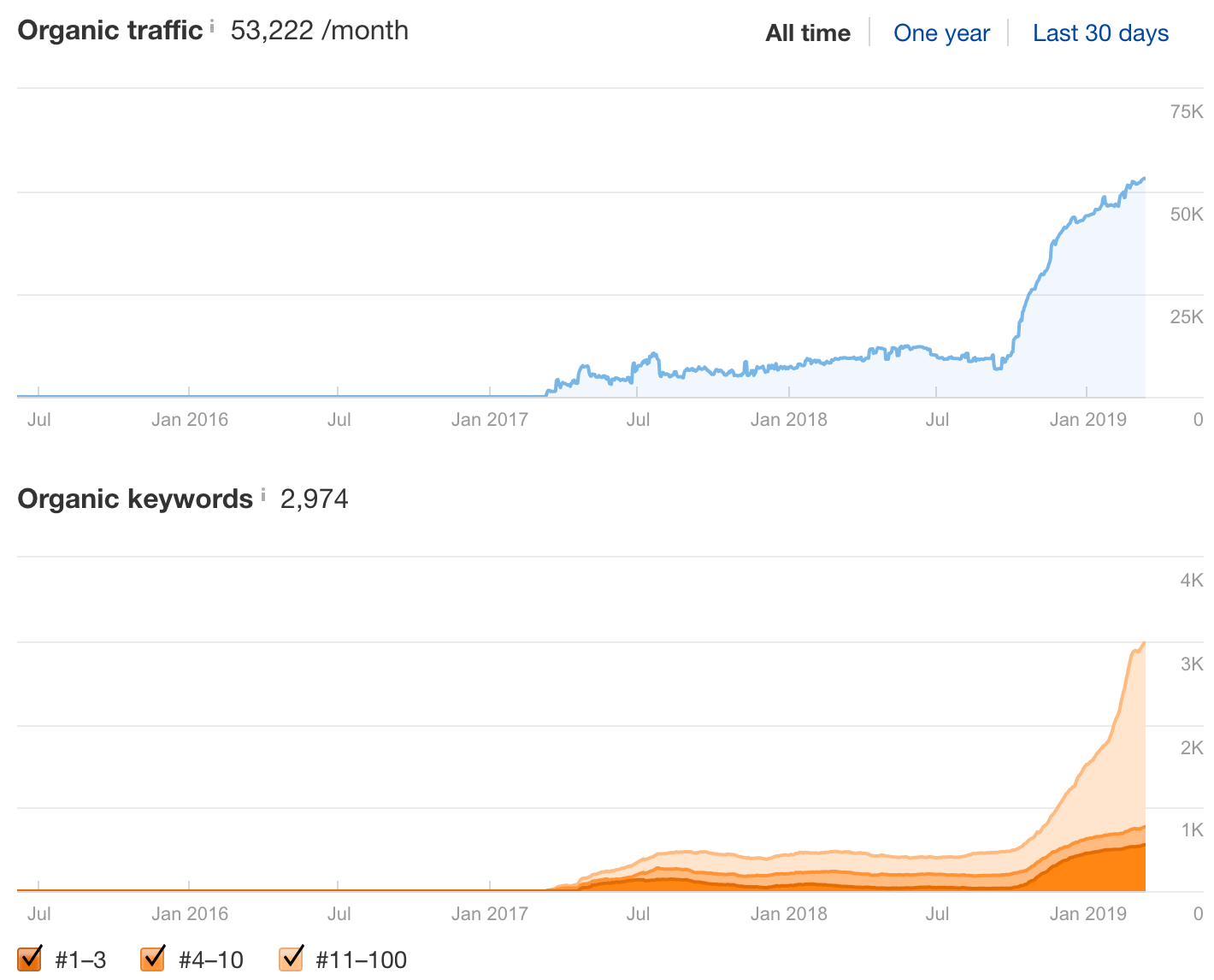
Heck, the page even survived a negative SEO attack where someone was kind enough to point ~30k low-quality backlinks from ~600 domains our way shortly after our rankings shot up.
We didn’t even bother to disavow them and the page is still going strong!
Bonus: win the featured snippet
A featured snippet is a brief answer to a user’s search query, which shows up at the top of Google’s search results.
Google extracts the snippet from one of the top‐ranking pages.
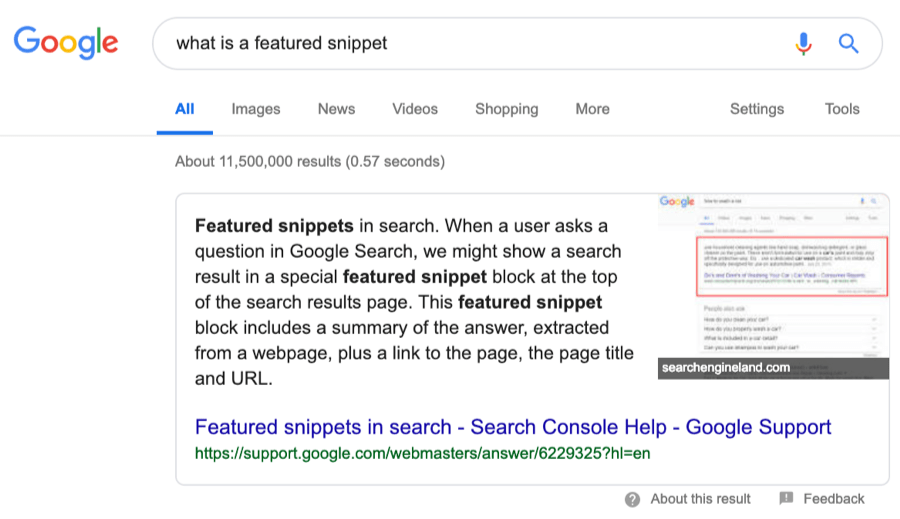
If you’re lucky enough to “own” the snippet, it results in a lot of extra visibility and more clicks. You also effectively steal clicks away from the other top-ranking pages.
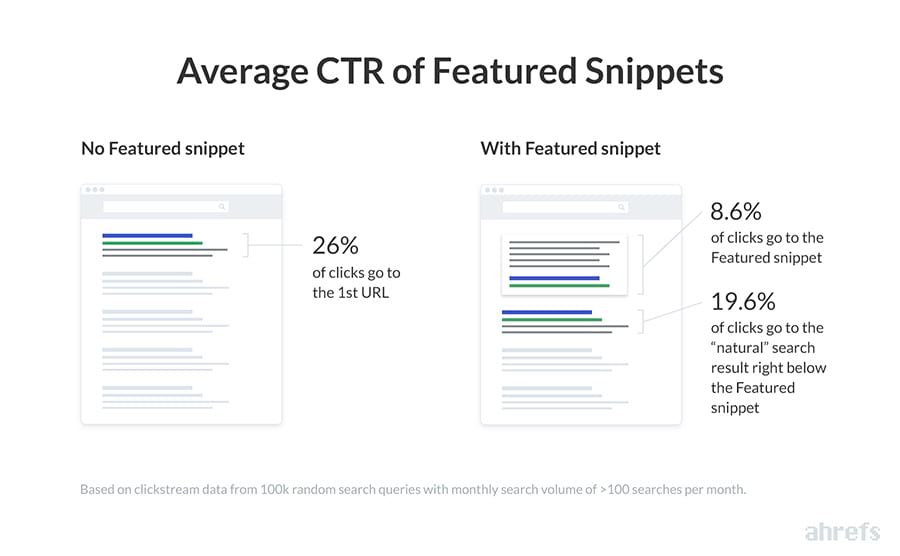
To illustrate this, take a look at the search results for “SEO tips.”
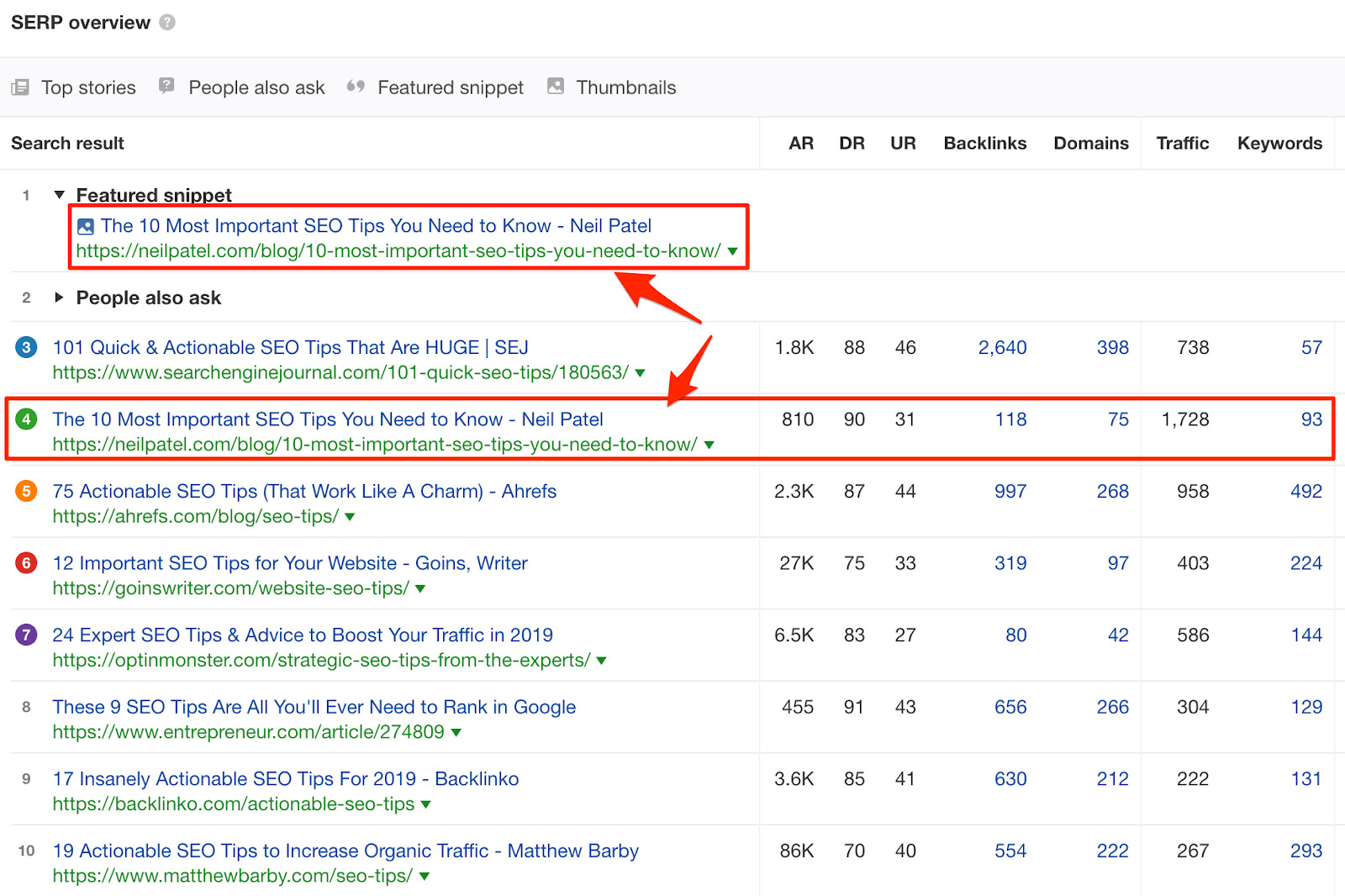
We rank in position #5. If Neil Patel didn’t own the snippet, our page would have the most search traffic of all the results.
How do we know? Because if we check the Organic keywords report for that page in Site Explorer, we see this:
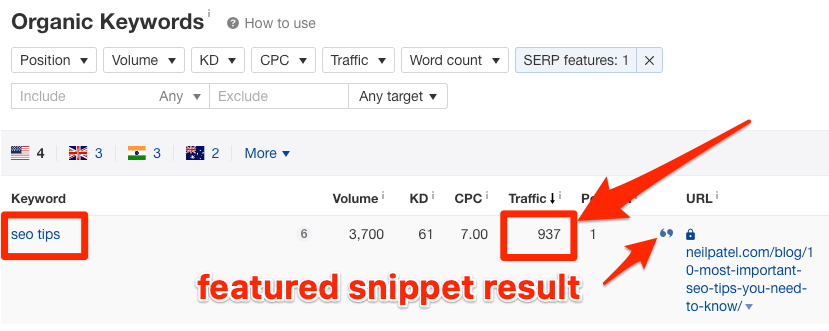
That featured snippet sends him 937 visits per month and accounts for over half of the traffic to the page!
Note. Winning snippets isn’t always easy, as demonstrated by the fact we still don’t own the snippet or “SEO tips.”
Looking to learn more about featured snippets? Check out our study of 2 million snippets, and our guide to finding and ‘stealing’ them.
For the record, we excluded SERPs with featured snippets when studying the top-ranking pages that get the most search traffic.
Back to you
I’m quite confident that most of what I said in this article is not news for the vast majority of you. But it never hurts to support opinions and assumptions with hard cold data, right?
And I have to be honest… it did surprise me that the top-ranking page only gets the most search traffic 49% of the time. I expected that number to be much higher.
Still, I hope this article helps to convince your clients, or CMO, that your job as an SEO professional isn’t to rank #1 for some keywords. It’s to help attract as much relevant search traffic as possible for a given topic.
Let me know in the comments if and when you realized that ranking #1 isn’t the true goal of SEO.
I’d also love to hear whether you’ve had any frustrating conversations about this with clients or bosses. 😉




